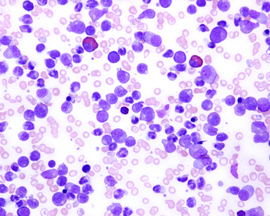
Myelodysplastic syndromes MDS are various disorders that usually occur when the cells in our body that make blood cells are or become abnormal. These abnormalities can result in low numbers of certain types of cells, such as red blood cells or white blood cells, which may affect how a person’s blood clots or make a person more susceptible to infections.
Past research shows that inflammation may play an essential role in MDS and associated diseases. Inflammation is often how your body reacts to something that harms it – such as infection or injury. We think that inflammation may drive bone marrow cells to become abnormal, contributing to the development of the disease. This research study aims to learn more about this process and how we might test and develop better treatments.
Study Details
- Physical exam
- Routine blood draws and urine tests
- Questionnaires
- Bone marrow aspirate and biopsy
- NIH-NCI experts will discuss your case, management, and other potential therapeutic trials for you
Who Can Participate?
- Individuals suspected or confirmed MDS
Principal Investigator: Kathy McGraw, PhD, NIH National Cancer Institute
Learn More
NIH Clinical Center Office of Patient Recruitment
800-411-1222
(TTY users dial 7-1-1)
Email: ccopr@nih.gov
Or go online
Refer to study # 000661-C
Department of Health and Human Services
National Institutes of Health Clinical Center (CC)
National Cancer Institute (NCI)

